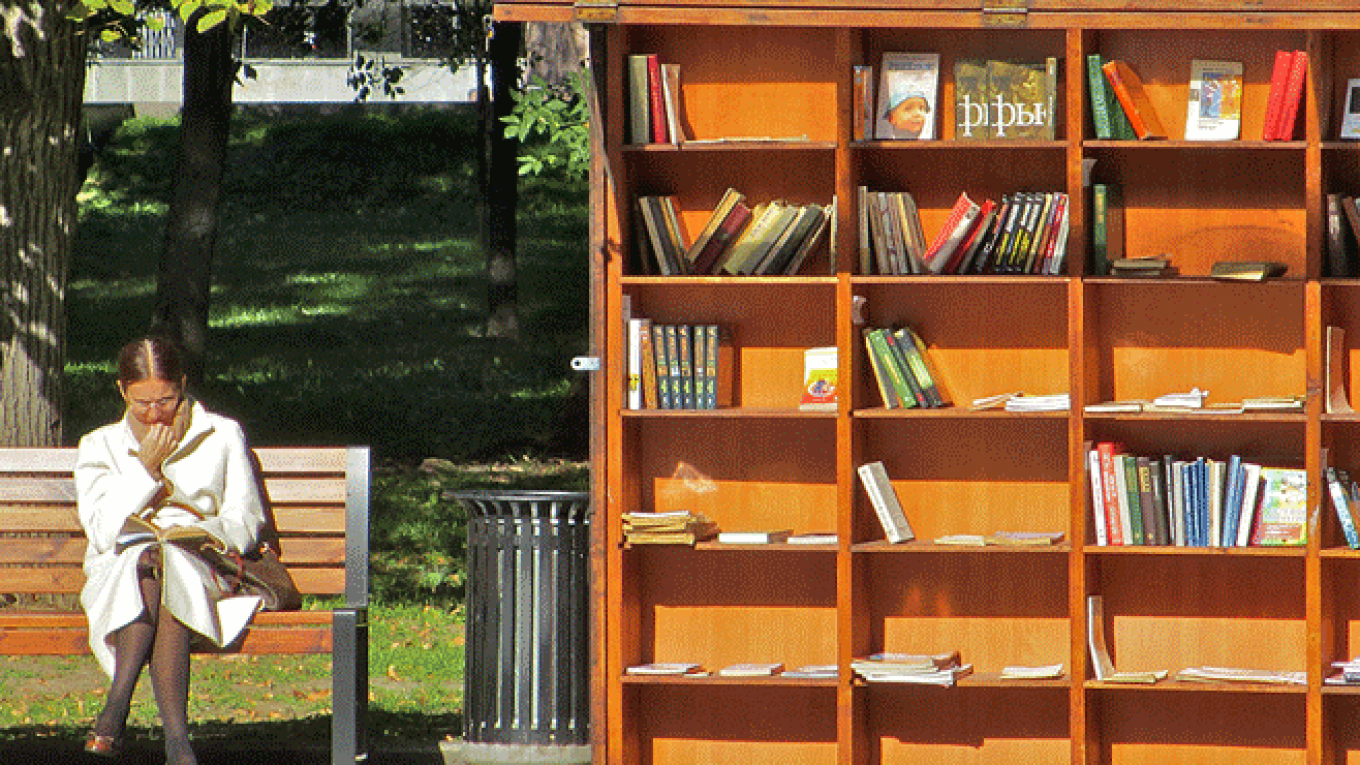I swear it's not my fault. I just went for a walk and happened to see a nice image come into my camera's viewfinder. I took the picture of a woman in a park reading a book next to an outdoor library and I got to thinking: books, literature, Russia.
What a cool thing, I thought. A library in the open air. The little bookshelf was topped off by the phrase "Books in Parks" in green letters. How lovely.
You all remember that old Soviet phrase: "The most reading nation in the world." It was true, I think.
I pitched a story to my editor, whose enthusiasm was so steeped in ennui that I almost quit before I began. "Oh, I'm sure we'll run it," he e-mailed me with what I imagined to be a ridiculing grimace followed by a deep, purging yawn.
Then it all began to happen.
An item cropped up Thursday on Gazeta.ru quoting the head of Moscow's culture department, Sergei Kapkov, as saying that not one single new reader registered at any of the city's 700 libraries over the last year.
That was around 2 p.m. By 6:40 p.m., following a couple of hours of attacks from Internet readers, the same source was quoting a less quarrelsome, perhaps slightly more thoughtful Kapkov. "Of course people are registering at libraries, but the situation in the city's downtown and in bedroom communities is different."
But Kapkov's comments had let something loose.
A few hours later I received an e-mail encouraging me to donate to a Russian crowd-funding initiative called Save the Reading Individual. It was, the ad claimed, launched by Prochteniye (Reading) magazine to ward off the extinction of "the reading individual (Lat. chervikus knigus), a rare species dwelling in places where large numbers of letters are amassed. It is smart, thoughtful, misunderstood by representatives of other classes. It feeds on good books."
So Kapkov was right. Even literary magazines are raising funds to combat the decline in readers.
Now the scientist in me awoke. I headed out for the theater and decided to count the readers on the metro. I'm pretty old, so I remember the 1970s in the Soviet Union when two out of every three heads in a subway car were buried in a book. The volumes were often thick — Russians love thick books, and we love them for that — and you could never tell what the book was because people covered them deftly in folded paper sacks.
I stepped into the subway car and began to peruse my fellow travelers. People sat with heads buried in something resembling reading, but were they really reading? Two individuals held electronic tablets and were definitely reading texts. A woman read a glossy magazine, and way down at the other end a man read a TV guide. Does that count as reading? Next to him was an elderly woman with a magazine rolled into a tight tube, as if she were ready to whack a fly. I don't think that counts as reading.
Half the rest of the car sat or stood with heads buried in various types of telephones. They appeared to be reading, but were they? One girl standing next to the door wasn't. She was playing electronic ping-pong.
Anyway, now I think I've got something for my skeptical editor. Russians read; they just don't do it like they used to.
But the dam had burst, and I didn't yet know that.
The next morning during my ritual Internet trawl of news big and small, I ran across several pertinent topics in hot succession.
On Facebook the distinguished translator Natalya Mavlevich wrote, "As ashamed as I, a philologist, should be to admit it, the fact is that I hate to work in libraries." Then the library part of the story took a dark turn. The Unian information agency posted information that Russian authorities in Crimea on Friday moved to "liquidate the Ismail Gasparinsky Crimean-Tatar Library."
All of a sudden my whimsical story became serious. But the world was still not done with me yet.
Minutes later on the TV Rain website I found a report that on Monday, Russian President Vladimir Putin will discuss with his security council the possibility of unplugging Russia from the worldwide net in the "event of an emergency."
So there's my story. Start with an idyllic picture in a park and a few steps later arrive at Internet Armageddon. How do you do that? You just talk about Russians and their reading habits, that's how.
A Message from The Moscow Times:
Dear readers,
We are facing unprecedented challenges. Russia's Prosecutor General's Office has designated The Moscow Times as an "undesirable" organization, criminalizing our work and putting our staff at risk of prosecution. This follows our earlier unjust labeling as a "foreign agent."
These actions are direct attempts to silence independent journalism in Russia. The authorities claim our work "discredits the decisions of the Russian leadership." We see things differently: we strive to provide accurate, unbiased reporting on Russia.
We, the journalists of The Moscow Times, refuse to be silenced. But to continue our work, we need your help.
Your support, no matter how small, makes a world of difference. If you can, please support us monthly starting from just $2. It's quick to set up, and every contribution makes a significant impact.
By supporting The Moscow Times, you're defending open, independent journalism in the face of repression. Thank you for standing with us.
Remind me later.







